Chaplin Blu-ray Movie
HomeChaplin Blu-ray Movie 
15th Anniversary EditionLionsgate Films | 1992 | 144 min | Rated PG-13 | Feb 15, 2011
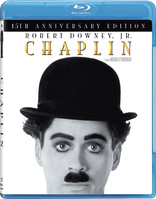
Price
List price:Amazon: $12.48 (Save 17%)
Third party: $12.48 (Save 17%)
Usually ships within 1 to 2 months
Movie rating
7.3 | / 10 |
Blu-ray rating
| Users | 3.7 | |
| Reviewer | 3.5 | |
| Overall | 3.5 |
Overview
Chaplin (1992)
A dramatized biography of the highs and lows in the life of one of the foremost comic geniuses the silver screen has ever known.
Starring: Robert Downey Jr., Dan Aykroyd, Geraldine Chaplin, Kevin Dunn, Anthony HopkinsDirector: Richard Attenborough
| Biography | Uncertain |
| Drama | Uncertain |
Specifications
Video
Video codec: MPEG-4 AVC
Video resolution: 1080p
Aspect ratio: 1.85:1
Original aspect ratio: 1.85:1
Audio
English: DTS-HD Master Audio 2.0 (48kHz, 24-bit)
Subtitles
English SDH, French, Spanish
Discs
50GB Blu-ray Disc
Single disc (1 BD)
Playback
Region free
Review
Rating summary
| Movie | 3.5 | |
| Video | 2.5 | |
| Audio | 4.0 | |
| Extras | 2.5 | |
| Overall | 3.5 |
Chaplin Blu-ray Movie Review
The Little Tramp makes for a Big, Big Film.
Reviewed by Jeffrey Kauffman February 10, 2011The word ‘superstar’ gets bandied about with such disregard nowadays that it’s hard to remember there was a time when it was reserved for a very few people whose fame had so superseded even the normal vagaries of fame that they needed a superlative to describe them. And perhaps the first person to fully personify the reach and impact of the term ‘superstar’ was Charlie Chaplin, an English lad literally raised in music halls who went on to create one of the most iconic characters of early cinema and whose contributions to motion pictures are with us, sometimes quite potently, to this very day. While it’s certainly possible to point out any number of stars, and some would argue even superstars, in early silent cinema, none of them had the lasting, multi-generational impact of Chaplin, and none in fact seemed to bridge the worlds of entertainment, business and even politics as seamlessly as did Chaplin. Anyone who has much experience with Hollywood biopics know they tend to, shall we say, liberally “interpret” the truth (don’t even get me started on Frances, the supposed biography of Frances Farmer). And so when Richard Attenborough announced plans to film a biography of Chaplin, stodgier souls who may have been less than enthralled with the director’s Gandhi (despite its multiple Oscars, including one for Attenborough himself), may have been shaking their heads in sullen bewilderment. And when it was further announced that Robert Downey, Jr. had been signed for the title role, there might have been outright laughter in Hollywood, and not the good kind. But against all odds, while Chaplin may not in fact be “the truth, the whole truth and nothing but the truth,” it manages to convey a feeling and indeed even a certain intimate knowledge about the long ago star. Perhaps even more amazing, it features an absolutely brilliant leading performance by Downey, one which helped establish him as one of his generation’s leading actors.
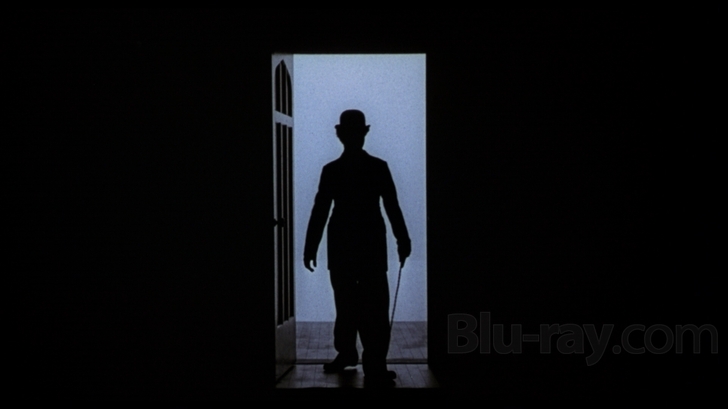
Attenborough took some heat from critics who accused his Gandhi of being a hagiography, but of course, the director was dealing with a quasi-religious figure whom many indeed considered a saint. One of the problems with Chaplin, however, is that Attenborough approaches his subject with much the same reverence and respect. While the screenplay doesn’t exactly shirk from Chaplin’s personal peccadilloes, they’re often placed within the context of the “Great Artist” syndrome, where these sorts of supposed eccentricities must be understood and even tolerated, since they stem from the same soul which is also providing the world with works of enduring value. Chaplin is often portrayed as the victim in this film, which in some cases may be true, but the only voice of Devil’s advocacy throughout much of the movie comes from the fictional character played by Anthony Hopkins, a ghostwriter who is helping Chaplin to craft his autobiography in the early 1960’s. Unfortunately this discursive approach isn’t intensive or deep enough to ever get at the source of some of Chaplin’s proclivities, including a seemingly insatiable desire for very young women.
Though this film is too long by at least a half hour, it also suffers from trying to stuff as many incidents from the filmmaker’s life into its running time. Chaplin’s life and achievements were so epochal that even a lengthy feature film like this can feel like shorthand. That’s nowhere more evident than when Attenborough injects supposedly “real life” elements which will later turn up in Chaplin’s iconic films. Early in his squalid London childhood, a blind woman with an apple tray slung around her neck walks by. Cue City Lights. Later on the beach Chaplin performs acrobatic tricks with an oversized beach ball. The Great Dictator, anyone? It’s not just not very subtle, it actually becomes laughable after a while and makes the film too self-conscious. This very self-consciousness is also amplified by Attenborough’s decision to mimic old time film techniques like iris dissolves, wipes and the like.
Where Chaplin succeeds stupendously is in a measured an often very affecting and effective performance by Downey. What makes Downey’s approach a little astounding is that he seems even better in the personal, off screen private Chaplin moments than he does when he assumes iconic Chaplin roles like The Little Tramp, and he is nothing short of amazing in those segments. Downey isn’t showy here, he’s quietly overwhelming as he seems to fully inhabit the emotionally turbulent person of Charlie Chaplin.
There are a host of interesting, sometimes effective, supporting performances here, including a semi-loathsome but hilarious Dan Aykroyd as silent film director Mack Sennett and Kevin Kline perfectly cast as the dashing Douglas Fairbanks, with whom Chaplin co-founded United Artists. Kevin Dunn is pretty much forced to enact a parody in his underwritten, hiss-worthy role of J. Edgar Hoover, a man who targeted Chaplin early in the star’s career and then never let up until Chaplin was exiled from the United States in the early 1950’s. Others in the large cast include David Duchovny as Chaplin’s longtime cameraman, James Woods as a vicious attorney who sues Chaplin for child support in a completely bogus paternity case that actually made blood tests finally legal in California after years of inadmissibility, and Diane Lane as Paulette Goddard, the actress who became Chaplin’s third wife. The most interesting casting choice here is Chaplin’s own daughter, Geraldine, who here is Chaplin’s mentally unstable mother in a disturbing and unsettling portrayal.
As with Gandhi, Attenborough’s ace production team recreates a huge swath of times and places, including everything from early 20th century English music halls to the halcyon days of early Hollywood (where La Brea was still mostly orange groves, incredibly) to Chaplin’s late in life refuge in Switzerland. There’s a very visceral and natural ambience that runs through this film which helps to offset its length and occasional lack of real drama. Though John Barry’s score received an Oscar nomination, I personally find it more than a bit anachronistic, somewhat akin to his “un-Western” sounding Dances With Wolves, and as disparate sounding as some of Maurice Jarre’s later scores for another “personal epic” filmmaker, David Lean. There is some nice utilization of Chaplin’s own unforgettable music, like “Limelight” and “Smile.”
Too often, though, the film glosses over elements that are central to understanding Chaplin’s character and his immense success and, later, downfall. United Artists is given short shrift here, even though it was the first artist-owned studio in Hollywood, something Chaplin jokes was like “the lunatics taking over the asylum.” Chaplin’s own political leanings are again treated almost as sidebars, despite the fact that rightly or wrongly they ended up getting him booted from the country he called home for decades. Brief interstitials with Hopkins asking Downey pointed questions about various topics are never really enough to develop themes or elicit really telling information about what ultimately made Chaplin tick.
They had really stopped making movies like Gandhi and Chaplin by the time Attenborough managed to get funding for two of his pet projects. Chaplin failed to become the international box office champion and succès d’estime that Gandhi did, which is odd considering Hollywood’s fascination with itself. A wag joked rather acerbically about Gandhi that it won all those Oscars because its title character was everything everyone in Hollywood wanted to be, namely famous, tan and thin. The problem with making a film about a real Hollywood icon is underneath all that fame is a flawed person, one which a hagiography is unsuited to effectively handle.
Chaplin Blu-ray Movie, Video Quality 
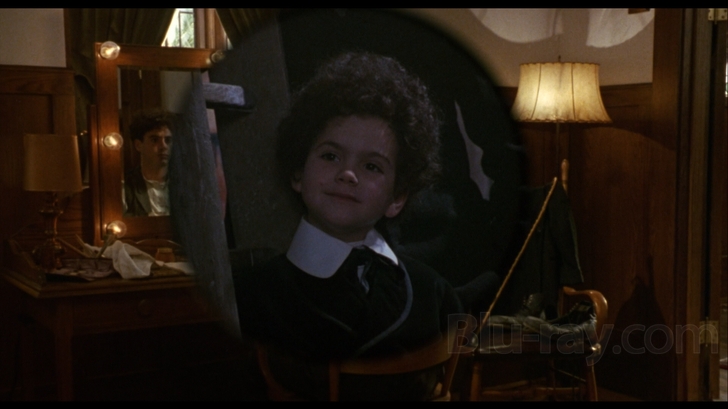
I wish I had better news to report about Chaplin's AVC encoded 1080p image in 1.85:1. Maybe our first clue should have been the odd soubriquet "15th Anniversary Edition" this Blu-ray release is saddled with, obviously culled from the special edition DVD which came out a few years ago. The last time I checked the distance between 1992 and 2011 wasn't exactly 15 years. Unfortunately it doesn't appear that any restoration of any kind was undertaken for this release, and the worse news is that the DVD release was not exactly stellar to begin with. Once again we're offered a dirty and dingy print that suffers from some very peculiar artifacts, including an almost seizure inducing flicker (and not the old black and white, silent movie kind). But the image here is really distressingly soft, made even uglier by noticeable edge enhancement, something that usually doesn't raise my ire as much as it does some of my videophile compatriots. Contrast is poor, too dark a lot of the time, and the overall look of the film is just sort of pasty and lifeless. There are a few bright spots here, notably in some of the brightly lit close-ups, when finally something akin to hi-def sharpness and clarity pops, albeit very fitfully, into view. This sadly has the look of a not very well upconverted DVD a lot of the time, and that's really a shame.
Chaplin Blu-ray Movie, Audio Quality 
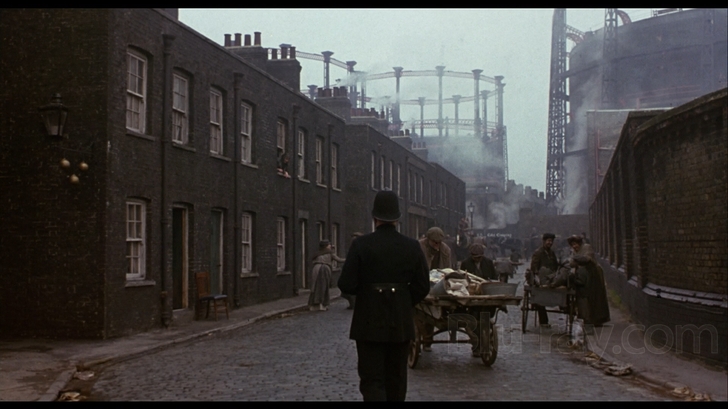
Things are at least a little better with regard to Chaplin's lossless DTS-HD Master Audio 2.0 mix. Obviously immersion and surround activity are not an issue here, but fidelity is excellent even if everything is played out on a very narrow soundfield. Dialogue, effects and John Barry's Academy Award nominated score are all very well mixed and the soundtrack does not suffer from any age related degradation or other issues. This isn't a knock your socks off sounding soundtrack, but it delivers the goods in a reasonably sharp and well modulated way and shouldn't be as disappointing to fans of this film as the image quality probably will be.
Chaplin Blu-ray Movie, Special Features and Extras 
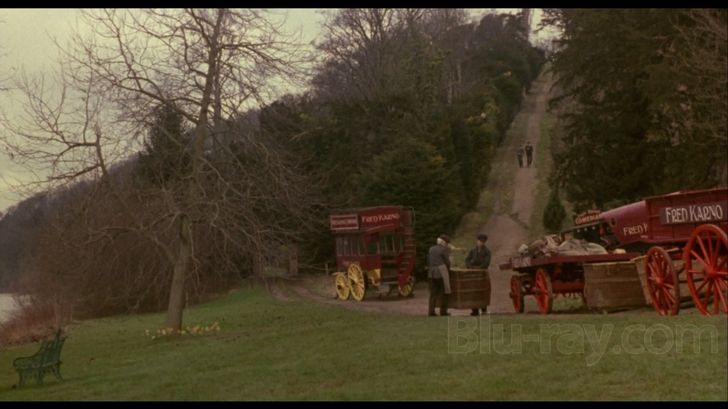
No new supplements to report on this Blu-ray:
- Strolling into the Sunset (SD; 7:30) has Attenborough discussing getting the film financed and his then-risky decision to cast Downey in the title role.
- Chaplin the Hero (SD; 6:06) discusses the star as archetype and film icon.
- The Most Famous Man in the World (SD; 5:27) talks about the multimedia onslaught which accompanied Chaplin's heyday as the reigning superstar of Hollywood and beyond.
- All at Sea (SD; 2:27) is probably the most interesting supplement, a short but fascinating home movie Chaplin made with Paulette Goddard.
- Theatrical Trailer
Chaplin Blu-ray Movie, Overall Score and Recommendation 
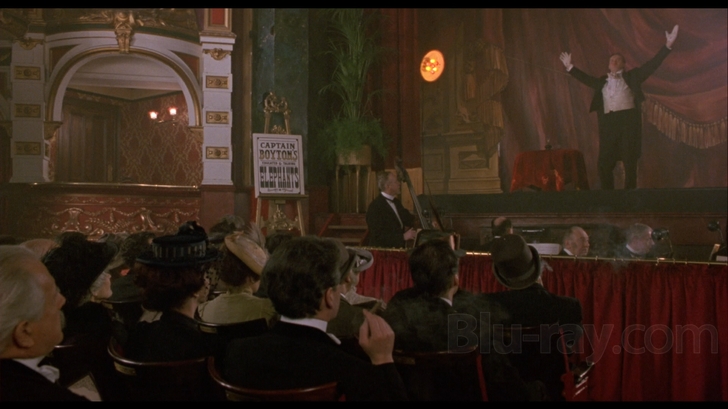
Chaplin suffers from an odd concatenation of problems. It's both too long and too discursive in its treatment of this legendary star's life. It also takes a too reverential approach to a figure who was not just controversial, but who had demonstrable behavioral issues which really could have been examined more critically. Still and all, it boasts one of the most impressive performances in relatively recent film history by way of Downey's completely convincing turn as Charlie Chaplin. Aided by a crack supporting cast and a really amazing production design, Chaplin may be slightly stodgy, but it's rarely boring. This Blu-ray unfortunately suffers from the same inferior image quality which plagued the DVD release, so it's difficult to give this an outright recommendation. Fans of the film may want to consider renting this title first to see how they feel about this new Blu-ray "not exactly 15th anniversary" edition.
Similar titles
Similar titles you might also like

Rosewater
2014

Jimmy's Hall
2014

Stan & Ollie
2018

Tolkien
2019

Fair Game
2010

Mary Shelley
2017

Conviction
2010

My Week with Marilyn
2011

Miss Potter
2006

Mandela: Long Walk to Freedom
2013

Nixon
Election Year Edition
1995

The Personal History of David Copperfield
2019

I, Tonya
2017

Lee Daniels' The Butler
2013

A Beautiful Day in the Neighborhood
2019

Bombshell
2019

On the Basis of Sex
2018

The Front Runner
2018

Vice
2018

Churchill
2017
